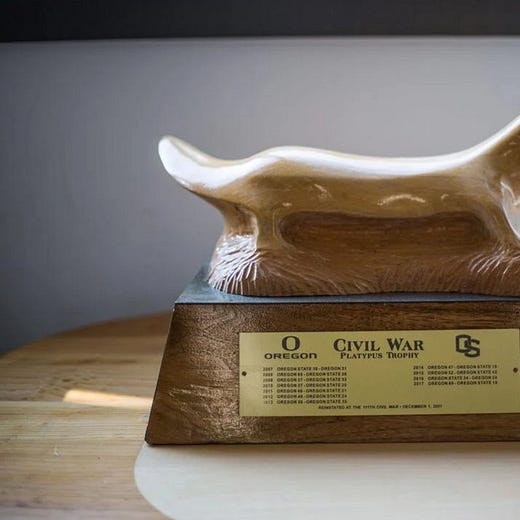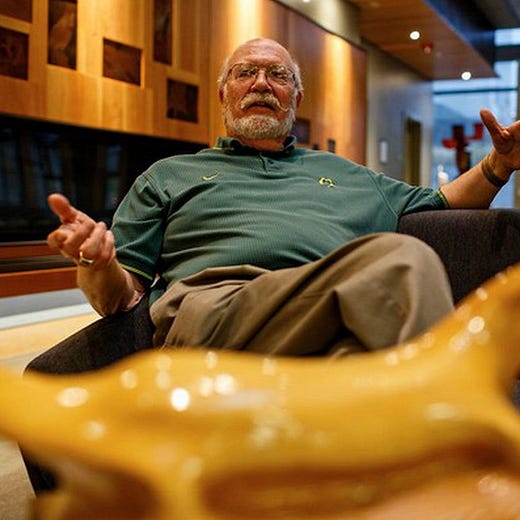Canzano: Ducks-Beavers rivalry name-game is tired
What do we call the Oregon-Oregon State game?
It’s been a while, so I reached out to officials at Oregon and Oregon State this week, asking whether they’d made progress in renaming the rivalry game known for nearly a century as “The Civil War.”
The answer from a Ducks spokesperson: “No.”
From the Beavers: “No conversations are active at this time around a name change — ‘Rivalry Game’ remains.”
What do we call the game formerly known as “The Civil War”?
The Civil Was?
In June of 2020, then-Oregon State president Ed Ray talked with then-Oregon president Michael Schill and issued a statement. Ray wrote, “Changing this name is overdue as it represents a connection to a war fought to perpetuate slavery.”
Some of you have argued that the result of the actual Civil War — a Union victory and the eventual abolition of slavery — is a positive association and worth celebrating. Others think it’s poor form to recycle the name of a four-year war that had a direct association with slavery and left more than 600,000 dead.
Others yet, argue that the Oregon-OSU rivalry nickname was never a literal reference to the American Civil War.
I’m not here for an American history debate. But I did reach out to six professors at Oregon and Oregon State to get their thoughts. None of them responded. It’s Thanksgiving week. If they reply, I’ll write a follow-up column on the subject.
My seventh inquiry went to J. William Harris, a professor of history (Emeritus) at the University of New Hampshire. That’s Chip Kelly’s alma mater. Harris got back to me via email and offered his thoughts:
Mr. Canzano -- in brief, different people fought the war for different reasons. There is no question that the Confederate states seceded (or tried to) in order to protect and perpetuate slavery.
The other states went to war to prevent secession and preserve the Union. Some in the Union thought of the war, from the beginning, as a war to end slavery, but the majority thought of it as a war to save the Union. Over time, many of those in the second category also began to think of the war as one to end slavery.
At a minimum, to call the Civil War as "a war fought to perpetuate slavery" is interpreting the war as having only one side, which, of course, is not how wars work.
How this should apply to a football game in Oregon in 2022 is something I can't answer. It would be one thing if one side dressed the cheerleaders as Confederates. Which, I'm sure, is not the case. Without knowing, I would guess that the nickname was nothing more than something intended to suggest that the rivalry was a big one.
As a historian, I would add that to summarize the war as a one to “perpetuate” slavery, rather than fought “because of” slavery, suggests a rather clueless university president.
Yours, Bill Harris
So there’s that.
John M. Bloss, president of Oregon State when the football rivalry began in 1894, was a former sergeant in the Union Army during the real Civil War. Bloss fought with the 27th Indiana Infantry Regiment and played a key personal role in the victory at the Battle of Antietam, where he was wounded.
I’d trust his judgment. I wish he were around to weigh in, but Bloss died in 1905 and is buried in his home state of Indiana.
The first reference to the Civil War football game appeared in local newspapers in 1929. Former Oregon Ducks coach John J. McEwan was the first to call the annual Beavers-Ducks clash “the great civil war.”
Maybe if we used “great” in front of lowercase “civil war” we’d get agreement? Or maybe the sides should just call it “The Platypus Bowl” and leave it be. The Platypus Trophy, designed by Warren Spady in the late 1950s, is already exchanged by the two alumni associations.
I’m not sitting on my hands. I’ve tinkered with renaming it “The Oregon Cup” or “Willamette Classic” in the last couple of years. Neither name stuck. I’ve solicited reader ideas and held polls. I’ve even offered that the naming rights of the rivalry should be sold to a corporation and the proceeds split by the NIL collectives at the respective universities.
“The Dutch Bros Cup?
“The Chip Bowl,” presented by Intel?
The players themselves would be big winners. But it turns out that the UO and OSU athletic departments already sell sponsorships for the rivalry series and keep the money for themselves.
Oregon and Oregon State will combine for 18 regular-season victories this football season. The teams have been terrific on the field. I think it’s going to be a fantastic and dramatic game at Reser Stadium on Saturday. I’ll make my official game prediction later today or tomorrow in print.
I won’t delay.
Meanwhile, it’s been almost 30 months since that joint announcement. UO and OSU have had plenty of time to figure out this rivalry naming business. They’ve left us a mess. It’s time to stop puttering around and name the Beavers-Ducks rivalry.
On that note, I’ll bet most of you still call it “The Civil War.”
I appreciate all who read, support, subscribe and share this new, independent, endeavor with friends and families. If you haven’t already, please consider subscribing. Your support allows me to go where the stories take us.






Civil War is perfect and there have been hundreds, maybe thousands of civil wars over time. The Civil War fought between the Union and Confederates in just one of many. The definition of Civil War is a "war between citizens of the same country". Replace country with state and voila, The Civil War Game. Stop the stupid.
Growing up in Oregon- I knew about the Civil War, Abe Lincoln and the North and South. My take on the football Civil War was Oregonians were divided on allegiances, but could remain Civil in spite of the differences. I had one sister at U of O, one at OSU at the same time. Civility still was in the house.
Personally I think the word police continue to go to far.